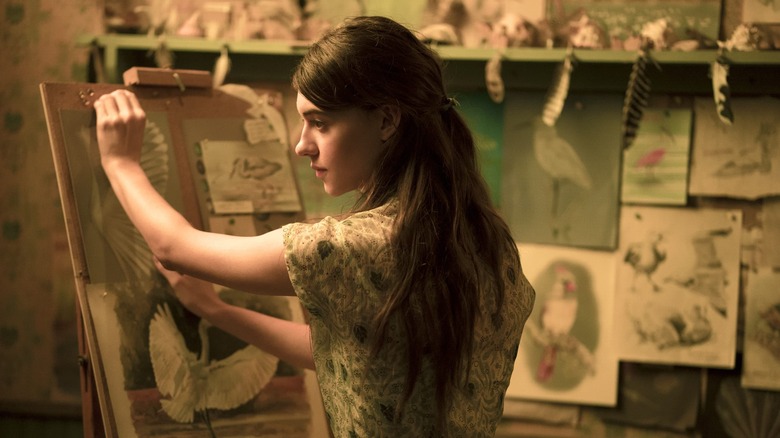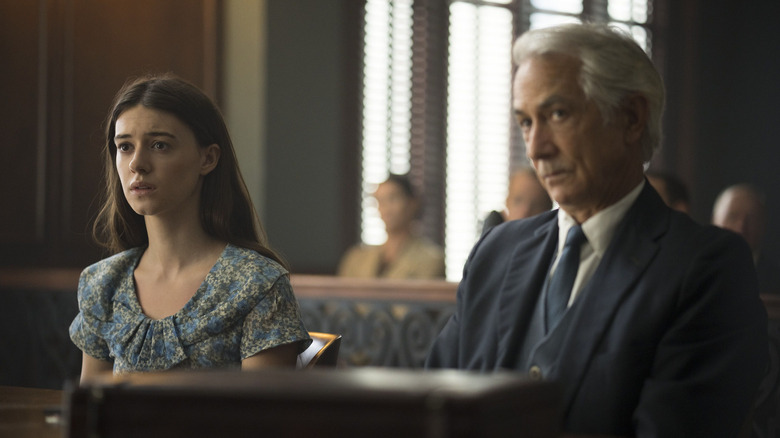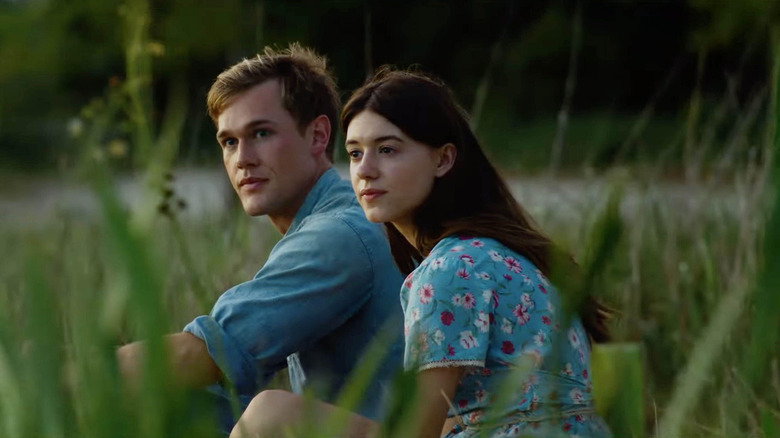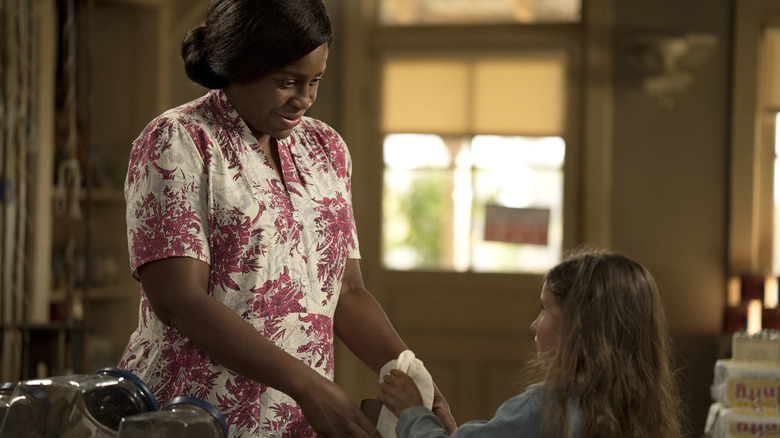Where The Crawdads Sing Author Delia Owens Is Still Wanted For Questioning In A 1996 Murder Case
Sometimes, fiction parallels reality in the strangest ways. There are dozens of terrifying instances where sci-fi hits a little too close to home by accidentally predicting the future, though when it comes to speculative fiction and our basically dystopian reality, what else is new? But you probably don't expect the same kind of coincidence from, say, a coming-of-age murder mystery. And yet here we are, one day away from the release of 'Where The Crawdads Sing," a sordid murder trial with its own personal behind-the-scenes scandal.
I'm convinced that everyone falls into one of three camps: either you're vaguely aware of the upcoming film, you're fully invested because you read the book in your book club, or you only know the name Delia Owens because you did an internet deep-dive after stumbling across TikToks or out of context tweets about the controversy. Whatever your mileage on the situation, you might want to buckle in for a recap of the wild details.
As /Film's Hoai-Tran Bui points out in her review of the film, "the most interesting part of "Where the Crawdads Sing" is not the Reese Witherspoon endorsement, nor its beautiful cast, nor the new Taylor Swift song that plays over the credits. It's the insane backstory of book author Delia Owens, who herself is still wanted in Zambia for questioning in a murder."
Believe it or not, this story goes back nearly three decades: In 1996, ABC debuted "Deadly Game: The Mark and Delia Owens Story," a special that centered on Owens, her husband at the time, and a tragic incident in Zambia, where the couple worked as conservationists. The point of the special was to capture the escalating tensions between poachers and wildlife conservationists — but shockingly, it also doubled as a snuff film for including an incident where a person is shot and killed on-camera.
The controversy behind Delia Owens
The victim, an alleged poacher, is executed while lying collapsed on the ground, having already been shot. During the clip, the victim goes unidentified by the story's journalist, as does the person who fires the gun. The film itself offers little evidence to suggest the person killed is a poacher and according to a 2022 update from The Atlantic, the ABC script refers to the victim as a trespasser, "though it is also unclear where this trespassing might have taken place."
In 2010, the incident was thoroughly documented by Jeffrey Goldberg in the New Yorker exposé, "The Hunted," where the cameraman (among others) revealed that they believe Owens' stepson Christopher Owens committed the murder. The story also includes witnesses, who claim that Mark Owens covered up the killing by disposing of the body, which was never recovered, in a lake. The family denied the accusations and when Goldberg interviewed Delia Owens, she said that her stepson was not present when the man was shot.
Goldberg, now editor-in-chief of The Atlantic, has been looking into the story for over a decade now and in anticipation of the upcoming film, returned to it via the 2022 Atlantic piece by digging even deeper. Among those he spoke to was Zambia's director of public prosecutions, Lillian Shawa-Siyuni, who revealed that the family is still wanted for questioning:
"There is no statute of limitations on murder in Zambia. They are all wanted for questioning in this case, including Delia Owens."
Siyuni also shared that the ongoing investigation has been "hampered by the lack of an extradition treaty between Zambia and the United States, and by ABC's apparent refusal to cooperate in the investigation."
Delia Owens and the Marsh Girl
That's where the story begins, but really it's just the tip of the scandalous iceberg. Famously, "Crawdads" is Owens' first novel, considered all the more impressive because it marked her fiction debut at 70 years old and became a best-selling sensation that spawned a Reese Witherspoon-produced feature film. But it certainly wasn't her first time being published. Owens spent 22 years in Africa with her husband, Mark, during which time they wrote three memoirs about their experience as conservationists.
Building off of the initial Goldberg piece, Slate's Laura Miller did a 2019 deep-dive on Owen's writing, pointing out that many of the themes and story beats of "Where The Crawdads Sing" echo the facts of the author's life. The novel tells the story of a girl in 1950s North Carolina who is forced to raise herself in an isolated swamp and, like Owens, is a naturalist loner who ends up caught in the middle of a murder trial. "Almost every part of the book has some deeper meaning," Delia once said in an interview with Amazon, to which Miller wrote:
"To anyone who has read 'The Hunted,' those lines are tantalizing, even if Owens doesn't mean them to be. Having her heroine stand accused of murder echoes the Owens' Zambian experience and the subsequent ordeal of becoming the subject of a 18,000-word exposé in a prominent magazine."
I'll stay clear of book spoilers, but Miller also points out that the whole ordeal becomes even more eyebrow-raising if you know the plot twist included in the novel's final pages.
But wait — there's more
Another troubling layer — and there are so many — are the criticisms that have been levied at "Where The Crawdads Sing" since its publication. The two central Black characters in the story, shopkeeper Jumpin' and his wife Mabel, act as surrogate parents to the abandoned Kya, and book critics have called out racial stereotypes behind their depictions. Owens' portrayal of Black characters has been called "improbable and condescending," a major factor in this is their phonetically-written dialogue (a "'Gone with the Wind'–style dialect," according to Miller). It all ties back to the conservationist work from Owens' past: during their time in Botswana and Zambia, the Owenses gained a reputation for their attitude towards African people.
One professional hunter who crossed paths with the couple said: "Their whole attitude was 'Nice continent. Pity about the Africans.'" In his piece for The Atlantic, Goldberg points out that the Owens Foundation website previously referred to Africa as "the Dark Continent" and Delia and Mark Owens' book "Secrets of the Savanna" calls for human population control across the continent. Even the documentary special about their work leaned heavily into a white savior narrative, including a broadcast intro from co-anchor Diane Sawyer that promised an emotional tale of two love-struck Americans in a "strange place" (i.e. an African country) saving elephants from poachers and corrupt African officials:
"They went halfway around the world to follow a dream. An idealistic American couple—young, in love. But a strange place and time would test that love."
It's all deeply disturbing, which means it's only a matter of time before Netflix buys the rights to the Owens family story and milks an entire miniseries out of this mess.



